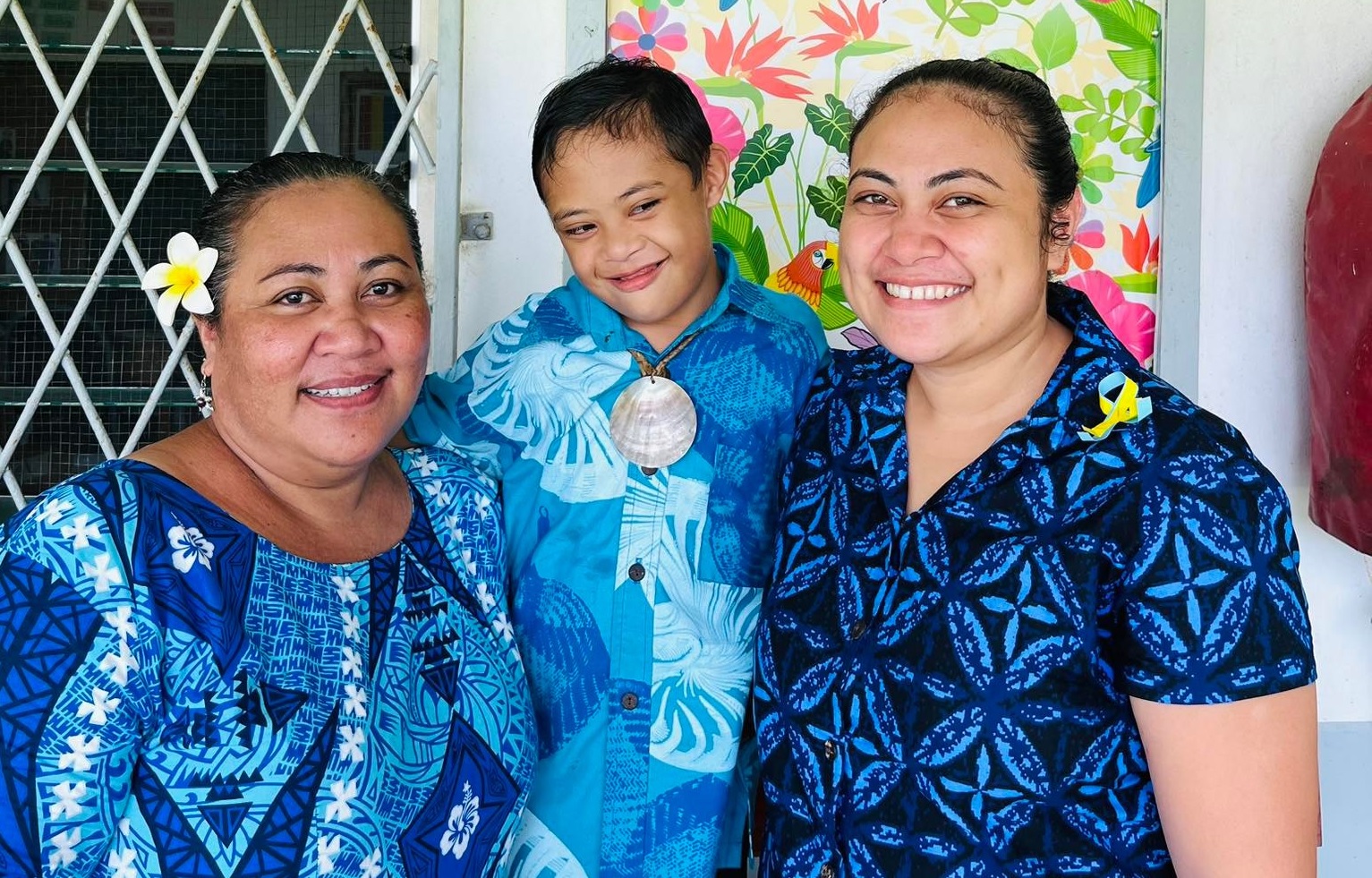Related News

Cheerful Ignatius with mom Lailoa Kilima and older sister Roselyn (right). Picture: SUPPLIED
By NIKHIL KUMAR
THE infectious smiles and innocent personalities of special individuals in our society bring a fresh ray of light. Some though are shunned because they are born with a chromosome disorder or abnormalities that many would deem unnatural, or a curse passed down through the generations.
Nine-year-old Ignatius Bali proves otherwise and has not let his disorder stop him from living his best life. Diagnosed with partial Down syndrome, Ignatius is very energetic, and as his family describes, carefree and fun with a knack for dancing.
Older sister, Roselyn, said he was a blessing for the family, a ray of sunshine in their lives. During the 2023 World Down Syndrome Day celebrations at Sigatoka Special School, where Ignatius attends, Roselyn said he took to the dance floor with his friends and enjoyed the day.
“He is my brother and that’s that. He isn’t abnormal or anything. He was born with Down syndrome,” she shared.
“It isn’t something that can be cured, it is a part of him and we love him very much. He’s actually quite smart and enjoys learning. He’s also very expressive and loves to show his emotions. The angel of the family really.”
Their father, Moses Bali, explained the family’s shock at finding out their youngest child was diagnosed with partial Down syndrome. The estimated incidence of Down syndrome is between
1 in 1,000 to 1 in 1,100 live births worldwide and like some families who are unfamiliar with the disorder, Mr Bali said they had to learn more about Down syndrome, its treatment and care.
“We were looking for answers as to how this happened but as time passed, we learnt to accept it,” he said.
“It did shock us at first because my three daughters did not have Down syndrome.
“We were informed that the changes of a genetic defect was high, especially having a child after a long time, and after the age of 35.”
Regular visits to the hospital when Ignatius was young became routine as he needed medical examinations to ensure his limbs, heart and other organs were functioning. All this before he was six months old.
“When he turned six years old, all the check-ups and hospital runs stopped. The doctor gave us the all-clear that our child was healthy,” Mr Bali said.
It hadn’t always been an easy adjustment, as Mr Bali explained there were stereotypical notions about Ignatius’ condition.
“Ignatius hasn’t faced any form of discrimination but my advice as a parent is for us to learn to accept people with Down syndrome because they are humans like everyone else. They are special, not cursed. They are very kind and intelligent in their own way.”
He said more awareness on Down syndrome should be carried out all schools, not just special schools. This way, he believes, society would be better informed about Down syndrome and ways to help those with the disorder.
Mr Bali says governments should also play a more proactive role in creating awareness on Down syndrome as well as look into increasing specialist pediatricians who can better advise and assist parents who have children with the disorder.
Suva resident Jone Smith (not his real name) was born with Down syndrome, and though he chose to share his experience on anonymity, the challenges he faced were a stark contrast to the Bali family’s caring and nurturing environment.
For Jone, Down syndrome affected his intellectual ability, which was more prominent than his physical features.
“My grandmother told me that when I was born, everything about my life was normal. When I started to show physical changes, my family started treating me differently,” he said.
“They would claim I was cursed or that our forefathers were not happy with the family.
“I was restricted from doing the simplest of things like playing with kids and when I was about 10 years old, they made me beg on streets because they wouldn’t give me food unless I helped with the house work or contributed.”
His grandparents soon discovered the ill treatment and took him away from his family. They took him to school and encouraged him to make friends.
“I love my grandparents very much. I still live with my grandmother, even after my grandfather passed away and I am grateful to have them in my life,” he shared.
According to the United Nations, the quality of life of people with Down syndrome can be improved by meeting their health care needs, including regular check-ups with health professionals to monitor mental and physical condition and to provide timely intervention be it physiotherapy, occupational therapy, speech therapy, counselling or special education.
“Individuals with Down syndrome can achieve optimal quality of life through parental care and support, medical guidance, and community based support systems such as inclusive education at all levels.
“This facilitates their participation in mainstream society and the fulfillment of their personal potential,” the UN shared on its official website as it dwelled on the theme for this year’s World Down Syndrome Day.
“The message of ‘With Us Not For Us’ is key to a human rights-based approach to disability. We are committed to moving on from the outdated charity model of disability, where people with disability were treated as objects of charity, deserving of pity and relying on others for support.”
The UN said a human rights-based approach viewed people with disabilities as having the right to be treated fairly and have the same opportunities as everyone else, working with others to improve their lives.
Every year on March 21, the world observes World Down Syndrome Day. The date denotes the 21st chromosome that is affected. The month of March denotes the third month of the year, and depicts the three chromosomes that are in the 21st chromosome instead of two.
Each year, approximately 3,000 to 5,000 children are born with this chromosome disorder.